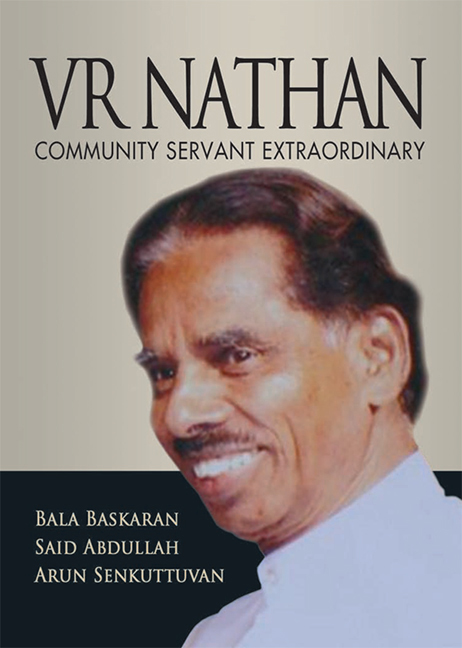Book contents
- Frontmatter
- Contents
- Foreword
- Message
- Preface
- Acknowledgements
- 1 VR's Inter-religious Leadership
- 2 An Immigrant who Made Good
- 3 Introduction to Temple Management Affairs
- 4 Invitation to Help out HEB
- 5 An Era of Change in HEB
- 6 VR's Signal Contribution to HEB's Transformation
- 7 Celebrating Hindu Festivals
- 8 Transforming the Temple Scene
- 9 VR's Views in Public Deliberations of Issues Affecting Indians
- 10 VR's Legacy
- Appendix
- About the Authors
- Plate section
9 - VR's Views in Public Deliberations of Issues Affecting Indians
Published online by Cambridge University Press: 21 October 2015
- Frontmatter
- Contents
- Foreword
- Message
- Preface
- Acknowledgements
- 1 VR's Inter-religious Leadership
- 2 An Immigrant who Made Good
- 3 Introduction to Temple Management Affairs
- 4 Invitation to Help out HEB
- 5 An Era of Change in HEB
- 6 VR's Signal Contribution to HEB's Transformation
- 7 Celebrating Hindu Festivals
- 8 Transforming the Temple Scene
- 9 VR's Views in Public Deliberations of Issues Affecting Indians
- 10 VR's Legacy
- Appendix
- About the Authors
- Plate section
Summary
During the early stages of his career with the Chartered Bank, VR probably considered himself to be a kind of expatriate – though he was a local employee – with a colonial bank who would be quite happy to be posted to India in his last year of service so that he could comfortably start his retirement in the country where he was born and educated. He had bought a house in Bangalore for his retirement. He sent his daughters to India for their education, though they agitated and soon returned to Singapore. He made sure that in Singapore his daughters went to girls-only schools so that they would grow up with conservative values and be able to settle down with husbands in India. When one of them could not get a place in a girls’ school, he did not mind keeping her at home for a year. He kept in touch with most of his relatives in India and helped a few. He took his family on regular visits to meet his relatives and friends in India. In short, he was very much an Indian Indian who was in Singapore to make a living – a good one as it turned out.
But by the time he actually retired from his service at the bank, his friendships and interests had changed so much that his outlook had changed completely. Being involved in religious affairs seems to affect one's perspective of home and sense of belonging in different ways. A predecessor of VR at HEB was Devan Nair, one of the most nationalist of Singapore's leaders. Soon after he took over the chairmanship of HEB, Devan Nair spoke of universal values and being a citizen of the world and at one time of even settling down at Auroville, near Pondicherry, India. (He did change his mind soon, but that is a different story.) Getting involved in HEB's affairs had the opposite effect on VR. He became a true Singapore Indian. Perhaps it was the frequent opportunity he had to soak in the aura of other strong Singaporeans that made him think Singaporean. Perhaps it was his exposure to a series of problems peculiar to a new nation and a multi-racial society – which was quite different from the accounts and systems related issues that he had tackled at the bank – that completed his conversion.
- Type
- Chapter
- Information
- VR NathanCommunity Servant Extraordinary, pp. 112 - 129Publisher: ISEAS–Yusof Ishak InstitutePrint publication year: 2012

